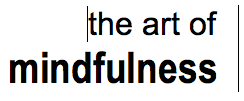ARTICLE: Mindfulness and Self-Compassion
/I was recently among a roomful of people who were invited to express what they appreciated about themselves. Many didn’t find this easy, and we laughed as it became more and more apparent that almost everyone in the room was reticent about, or found ways to sidestep the enquiry!
I see, over and over again, that even though we live in a culture of relative abundance - and therefore often indulgence - we are remarkably hard on ourselves. I hear from many students that their mindfulness practice uncovers patterns of thinking that are riddled with shoulds ought tos, musts, comparisons with others and a general sense of not measuring up.
True self-compassion, like any other qualities of the spirit, cannot be forced or strategised. Someone might decide they want to be more compassionate, and go about it through behavioural means. They may fool a few people, but I tell you truly, the real heart of it will be missing. You will have heard pieces of music played by rote by someone with none of the feeling or spirit – I would call this love - that brings the music alive. Self-compassion is like this. I can’t wake up one morning and start, by my own decision, to be deeply kind to myself. All the underpinning conditioning, the thoughts, the self-doubt – yes, all the things we start being more aware of in mindfulness practice - will still be in place, undermining personal efforts to change. Changing behaviour pastes something else on top of that programming, but when any test arises and there isn’t time to get strategic about behaviour, I will see what responses are really impressed into me.
In mindfulness practice, we begin to notice what’s here right now. We notice patterns of thinking and we don’t try to fix or change them, or to empty our heads of thought (an impossible task!) Rather we witness the play of conditions, and keep bringing our mind back to the present moment. We begin to get a little more familiar with what we’re up to most of the time – you know, avoiding, judging, comparing, strategizing, fantasizing, regretting, anticipating, planning, re-living…. and infinitely on. We begin to see that we are not our thoughts, or our feelings, that they aries, and go away again, some quicker than others... We notice the persistent patterns, and perhaps develop some humour around this. Ah, jealousy, there you are again – what a surprise!
And we keep bringing our mind back to the present, to the breath, to our bodies, or whatever the object of our practice is. That’s the work: observing what we’re doing, where we’ve gone, how we avoid the present – and we come back. That’s the muscle we work – the one that brings us home to the OK-ness of each unproblematic moment.
People often tell me that after time practising mindfulness, they notice the arising of more compassion towards themselves, almost as a fruit of something else. This happens slowly, and not as a result of trying. One thing that contributes to this is that often a person starts to really feel the true cost of lack of compassion.
And it’s often suffering, isn’t it, that triggers any deep change. When you start to feel in your body the hardness of self-judgment, the ways that you rob yourself of the natural joy of being, by believing the lies and stories your mind can be obsessed with, then there’s a point at which you might feel in the subconscious mind: enough!
This is a sort of waking up, the opening of our eyes to the suffering of being so hard on ourselves, the suffering of feeling that somehow, we’re fundamentally just wrong. You begin to wake up to the cost of what unloving does to the force and the spontaneous expression of your inherent life.
Mindfulness starts as a behavioural discipline, for sure, when we decide to make time to sit for a certain period each day. But over time, through a sort of indirect grace, it clears the way for various qualities of the spirit to be expressed in the rest of our lives.

